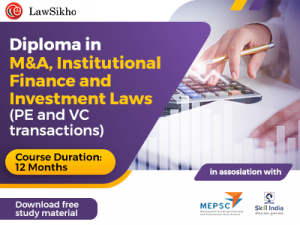
This article has been written by Milendra Jain, pursuing a Diploma in M&A, Institutional Finance, and Investment Laws (PE and VC transactions) from LawSikho.
Table of Contents
Introduction
Nothing in history has changed the business landscape as quickly as the Covid – 19 has changed, as social isolation and other restrictive measures have put significant impacts on the global business structure. It is no longer business as ‘usual’ but a ‘new normal. However, the pandemic hasn’t changed the purpose of due diligence (“DD”). It becomes even more important to ask “What is at stake when we talk about DD?”, as the pandemic brings several uncertainties which were never precedent before. The buyer needs to understand that in what terms the pandemic (and post-pandemic) will impact the business especially, on financial aspects. That said, an audit is an investigation into the historical financial statements of an entity, in order to determine that financial statements represent a “true and fair view” and the audit DD is the process that is used to investigate, analysis and evaluate working capital, debts, taxation, equity value, revenues and earnings, cash flows, projections, and other risks areas. In this article, the author is going to discuss how audit DD is conducted? what are the key issues in Financial DD? and what are the topics of inquiry in Financial DD?
DD is an investigation into the affairs of the targeted entity, generally conducted after reaching an initial agreement by signing of a ‘term sheet’ or ‘letter of intent or ‘memorandum of understanding and signing of a confidentiality agreement. It enables an entity to carry forward the transaction/deal from an informed standpoint. However, it is the process that confirms the historic performance of the business and predicts what will be the future of the deal by assessment of the strategic fit and marketplace. It is a must for an entity to deep dive into the DD, for a successful closure. In M&A, generally, there are various types of DD, depending upon the nature of the business involved in a deal.
Tools for conduction DD are the documents made available in the Physical Data Rooms or Virtual Data Rooms. These data rooms consist of several important documents to be kept for review in order to communicate issues through DD Report to the acquirer. However, due to the amidst pandemic, the DD process has undergone a change as it shifted the process to Virtual Data Rooms.
Financial due diligence
In order to assess the true value of the targeted entity, a financial DD is conducted. It analyzes the financial health of the targeted entity through historical results. It includes investigation into quality and sustainability of earnings and cash flow, conditions and value of assets, potential liabilities, tax implications, accounting policies, etc. Financial DD includes normalizing adjustments in the target’s earnings before interests, tax, depreciation, and amortization (“EBITDA”), as it places the focus on the financial outcome of operating decisions in order to determine the business value by removing non-operating decisions.
However, there is a considerable shift from the analysis of historical results because of the Covid – 19, as the businesses are facing extreme uncertainty. Therefore, financial DD needs to be tailored accordingly in order to evaluate the true value and risk allocation. As the valuation analysis of the entity becomes more difficult, the parties to a deal can opt for other consideration mechanisms such as in the form of earn-outs and other adjustments in the purchase price in order to find a viable way to reduce risk.
Objectives of financial due diligence
A financial DD provides valuable information while evaluating a potential business acquisition. From the perspective of both buyer and seller, it is in the best interest to conduct a financial DD as it reviews and represents the key driving forces to evaluate the true economic position of the seller. It is also essential to conduct the Financial DD for the following objectives:
- Target evaluation
- Validate the financial state
- Inorganic growth strategy
- Investment hypothesis
- Working capital trends
- Growth & diversification strategy
Financial due diligence – sell-side
Sell-side financial DD is a process whereby a seller engages in a DD to analyze and identify strengths, opportunities, earning analysis, key financial data, income statement analysis, deal financials, etc. in order to maximize the purchase value for the buyer in order to achieve best possible value for their business. However, it is uncommon for sellers to go for financial DD, but going through such a process can reduce future costs and facilitates speedy closure of the deal.
Financial due diligence – buyer side
A buyer needs to be assured about what financial risks exist in the targeted entity and to draw a mechanism in order to mitigate the risks involved in the deal. Therefore, this can be ascertained through financial DD, as it facilitates transmission of the key financial documents of the seller to the buyer under the signed Non-Disclosure Agreement between the seller and the buyer.
Considerations in financial due diligence
- Assessing performance: As the basic objective of the financial DD is to ascertain the value and performance of the targeted entity, the performance of the company can be evaluated through normalized EBITDA which excludes interests, tax, depreciation, and amortization i.e., the gross earning of the targeted company.
- Financial reporting: It is also one of the main aspects of the financial DD, as it requires in-depth investigation into the accounts of the targeted entity to ascertain ‘whether the entity has complied with all financial reporting and provides true and fair value. Covid – 19 has impacted various financial reporting requirement as follows:
- Fair value measurement;
- Going Concern assessment;
- Re-assessment of accounting estimates;
- Consolidated Financial Statements.
3. Revenue: In recent times of pandemic, it becomes more important to review the revenues of the company in order to mitigate future risks associated with such uncertain times.
4. Gross profit margin: One of the important factors in various deals is the evaluation of the profit margin of the business. The buyer should ensure that the business should have a consistent gross profit margin that avoids several price problems.
5. Working capital: It is one of the essential considerations in order to determine the value of current assets and current liabilities of the targeted entity. In order to mitigate liquidity issues at the time of closings, buyers should duly consider working capital as it also determines the targeted entity’s value.
Topics for inquiries in financial due diligence
- Are the financial statements of the targeted entity audited?
- What amount/level of working capital does the company require to be continued as a going concern?
- Is the gross profit margin growing or not?
- Do the balance sheet and income statement show true and fair value?
- What are the key income drivers?
- Whether the historical revenue will be feasible in the future?
- What capital expenditures and other investments will need to be made to continue growing the business, and what are the company’s current capital commitments?
- Whether any future commitments and contingencies persist?
- Whether all financial reporting compliances are met?
- What are the accounting implications of the transaction?
Conclusion
Financial DD or audit DD is the same thing, as it deals with the financial aspects of an entity, in order to derive a value against the targeted entity by investigating and assessing the financial position of the entity. It is essential to conduct an in-depth financial analysis in order to negotiate the final purchase price. Financial DD also helps to assess both the current value and future viability of the targeted business. Also, Covid – 19 has brought unprecedented risks and uncertainty which impacted the financial results of various businesses. Therefore, buyers should consider various aspects of the pandemic through a proper DD in order to mitigate the risks attached to it.
Students of Lawsikho courses regularly produce writing assignments and work on practical exercises as a part of their coursework and develop themselves in real-life practical skills.
LawSikho has created a telegram group for exchanging legal knowledge, referrals, and various opportunities. You can click on this link and join:
 Serato DJ Crack 2025Serato DJ PRO Crack
Serato DJ Crack 2025Serato DJ PRO Crack









 Allow notifications
Allow notifications


